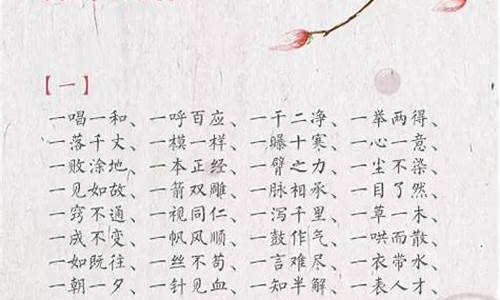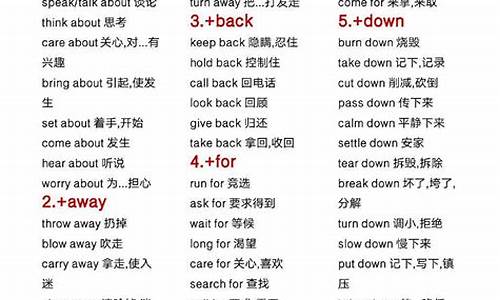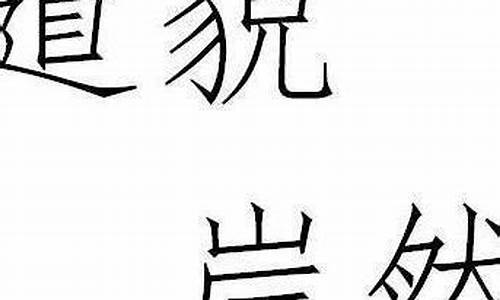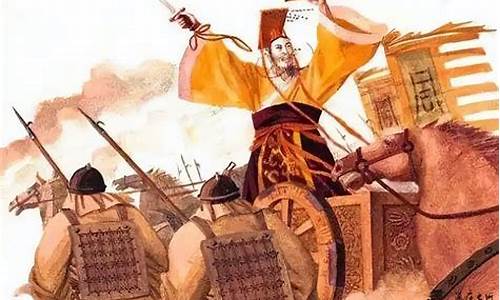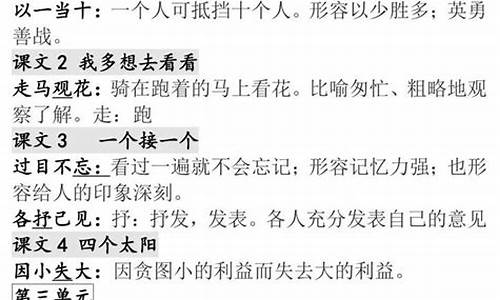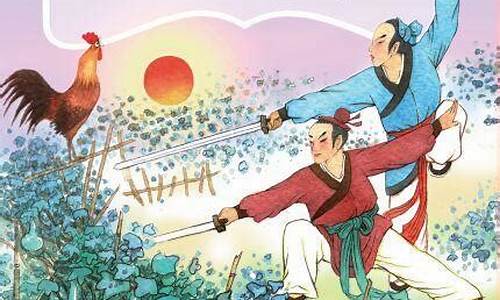中国成语故事英文版简短简单_中国成语故事英文版简短简单易懂
很高兴有机会参与这个中国成语故事英文版简短简单问题集合的讨论。这是一个多元且重要的话题,我将采取系统的方法,逐一回答每个问题,并分享一些相关的案例和观点。
1.?й????????Ӣ?İ??̼?
2.简单英语中国成语故事30字
3.守株待兔成语故事英文版?
4.谁能将中国某个成语故事翻译成英文?
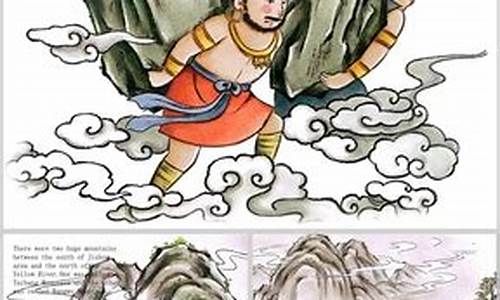
?й????????Ӣ?İ??̼?
给你个博客网址,上面有很多。
/blog/chaney/blogview.asp?logID=8694&cateID=1243
拔苗助长
To Pull up the Seedlings to Help Them Grow
宋国有个人担心自己的 秧苗 长得太慢。于是他把一颗颗秧苗拔长了些。然后 疲惫 的回了家。 " 今天我可累坏了,我帮助秧苗长长了! " 。他对家人说。 他的儿子 急忙 跑到田里去看看是怎么回事。他发现所有的秧苗都 枯萎 了。 《孟子》
A man of the state of Song was worried about his seedlings growing too slowly. He pulled up the seedlings one by one and came home exhaustedly." I am tired out today. I helped the seedlings grow," he said to his family. His son hurried to the fields to have a look and found that all the seedlings had shriveled up. Mencius
词汇:
1 秧苗 yāng miáo 农作物的幼苗
seedling
2 疲惫 pí bèi 很累
exhaustedly
3 急忙 jí máng 心里着急,行动加快
hurry
4 枯萎 kū wěi 干枯萎缩
shrivel up
成语故事
中国古时候宋朝有一个很幽默的人,他叫孙山。有一年他去参加考试,公布名单时他是最后一名。回到家,他的邻居向他打听自己的儿子考得怎么样。孙山笑着对邻居说:“孙山考了最后一名,你儿子的名字还在孙山的后面呢。”
In the Song Dynasty there was a joker called Sun Shan. One year he went to take the imperial examination, and came bottom of the list of successful candidates. Back in his hometown, one of his neighbor asked him whether the neighbor's son had also passed. Sun Shan said, with a smile:"Sun Shan was the last on the list. Your son came after Sun Shan."
简单英语中国成语故事30字
退避三舍
Retreating about Thirty Miles as Condition For Peace
During the Spring and Autumn Period (770-476 B.C.), Duke Xian of the State of Jin Killed the crown prince Sheng because he had heard slanders about Sheng and believed them. He also sent his men to arrest Chong Er, Shen Sheng and believed them. He also sent his men to arrest Chonh Er, Shen Sheng's brother. Hearing the news, Chong Er escaped from the state of Jin, remaining a fugitive for more than ten years.
After innumerable hardships, Chong Er arrived at the State of Chu at last. King Cheng of the State of Chu treated him with high respect as he would have treated the ruler of a state, believing that he would have a vright fuure.
One day, King Cheng of the State of Chu gave a banquet in honoudr of Chong Er. Suddenly, amid the harmonious atmosphere of drinking and talking, King Cheng of the State of Chu asked Chong Er. "How will you repay me when you return to the State of Jin and become its ruler one day?" After thinking for a moment, Chong Er said, "You have plenty of beauties and attendants as well as jewelry and silk cloth, and the state of Chu abounds in rare brides and animals. What treasure can the State of Jin boast having to present to your majesty?" King Cheng of the State of Chu said, "You are too modest. Nevertheless, you still have to show your gratitude to me in one way or another, I presume?" Smiling, Chong Er answered, "If I should be fortunate enouge to return to the State of Jin and become its ruler, the State of Jin would be friendly to the State of Chu. If, one day, there should be a war between the two states, I would definitely order my troops to retreat three SHE (one SHE is equivalent to thirty LI. The LI is a Chinese unit of length equivalent to 1/2 kilometre. And, therefore, three SHE is about thirty miles.) as a condition for peace. If, under that condition, you were still not reconciled, I would have to fight with you."
Four years later, as might be expected, Chong Er returned to the State of Jin and became its ruler. He was none other than Duke Wen of the State of Jin famous in ancient Chinese history. Ruled by him, the State of Jin became increasingly powerful.
In the year 533 B.C., the Chu troops and the Jin troops confronted each other in a battle. Faithful to his promise, Duke Wen of the State of Jin ordered his troops to retreat about thirty miles. After retreating, the Jin troops were stationed at Chengpu. Seeing that the Jin troops were retreating, the Chu troops thought that the enemy troops were afraid, and began chasing them. Taking advantage of the Chu troops' arrogance and their talking the Jin troops lightly, the Jin troops concentrated their forces and inflicted a crushing defeat on the Chu troops, thus winning the victory of the battle of Chengpu.
This set phrase, "retreating about thirty miles as a condition for peace," is derived from the Chapter "The Twenty-second Year of Duke Xi" in ZuoZhuan, the famous commentary by Zuo Qiuming on The spring and Autumn Annals. The idea of this set phrase is to give way to somebody in order to avoid a conflict.
退避三舍
退缩约三十英里, 在春秋时期(公元前770-476年)的和平条件 ,杜克西安晋国皇太子盛,因为他听说诬蔑盛,并相信他们。他还派他的手下逮捕,沉盛重耳,并相信他们。他还派他的手下逮捕Chonh呃,申生的弟弟。重耳闻讯,逃出了晋国,其余的逃犯十余年。 经过千辛万苦,重耳来到楚国最后。景程的楚国与崇高的敬意,因为他会处理一个国家的统治者对待他,相信,他会有vright fuure。 有一天,景程的楚国设宴招待重耳honoudr 。突然,在一片和谐的气氛中,喝酒和说话,景程的楚国问重耳。“你将如何报答我,当你回到晋国,成为它的统治者吗?” 沉吟了片刻后,重耳说:“你有很多美女和服务员,以及珠宝和丝绸布,楚国盛产罕见的新娘和动物什么珍奇呈现给晋国夸大王呢?“ 楚国的成王说,“你太谦虚了,不过,你仍然有这样或那样的显示您的感谢我,我相信吗?” ,重耳笑着回答,“如果我应该幸运enouge,回到晋国,成为它的统治者,晋国楚是友好国家,假如有一天,应该有之间的战争两种状态,我肯定会命令军队撤退三个SHE(一舍等于三十里。LI是一个长度单位,相当于中国1/2公里,因此,她是大约30英里。)和平条件,在该条件下,如果你仍然不甘心,我跟你拼了。“ 四年后,可以预料,重耳回到晋国,成为它的统治者。他以外,没有晋国在中国古代历史上著名的晋文公。他统治,晋国日益强大, 在公元前633年,楚国和晋国的军队在一次战斗中面对对方。忠实晋国的晋文公为了实现他许下的诺言,下令军队撤退大约30英里。撤退后,晋国的军队驻扎在城濮。楚军见晋军后退,以为敌军害怕,开始追逐他们。晋国的军队利用楚军的嚣张气焰和他们坦率的谈话晋国的军队掉以轻心,集中他们的力量和,造成大败楚军,从而赢得了城濮之战的胜利。 这个成语,“撤退约30英里和平条件“,是源于章”第二十二届年在著名评论左丘明“左传”,春秋公羊传“僖公。这组短语的想法是,为了避免冲突,让位给别人。
守株待兔成语故事英文版?
1 揠苗助长 :比喻急于求成反而于事无成。
春秋时期,宋国有一个农夫,他总是嫌田里的庄稼长得太慢。 于是,他来到田里,把禾苗一棵一棵地往上拔。第二天,他发现田里的禾苗全都已经枯死了。
2 乘风破浪:形容不怕困难,奋勇前进的精神
古代南北朝的时候,宋国有位将军姓宗名悫,他从小就很勇敢,也很有抱负。有一天,宗悫的叔父问他有什么志向,宗悫回答道:“愿乘长风,破万里浪。”宗悫经过勤学苦练,努力奋斗,终于成为一位能征善战的将军。
3 一衣带水:比喻只隔了一条狭窄水域的,靠得非常近的两地
南北朝的时候,北方的北周和南方的陈国以长江为界。
北周的宰相杨坚,废了周静帝,自己当皇帝,建立了隋朝。
他决心要灭掉陈国,曾说:“我是全国老百姓的父母,难道能因为有一条像衣带那样窄的长江隔着,就看着南方百姓受苦而不拯救他们吗? “
谁能将中国某个成语故事翻译成英文?
⑴ 守株待兔的成语故事守株待兔成语故事:
相传在战国时代宋国,有一个农民,日出而作,日入而息.遇到好年景,也不过刚刚吃饱穿暖;一遇灾荒,可就要忍饥挨饿了.他想改善生活,但他太懒,胆子又特小,干什么都是又懒又怕,总想碰到送上门来的意外之财。
奇迹终于发生了。深秋的一天,他正在田里耕地,周围有人在打猎。吆喝之声四处起伏,受惊的小野兽没命的奔跑。突然,有一只兔子,不偏不倚,一头撞死在他田边的树根上。当天,他美美地饱餐了一顿。
从此,他便不再种地。一天到晚,守着那神奇的树根,等着奇迹的出现。
成语“守株待兔”,比喻亡想不劳而得,或死守狭隘的经验,不知变通。
(1)守株待兔成语故事英文版扩展阅读
守株待兔
成语拼音:shǒu zhū dài tù
成语解释:比喻死守狭隘经验;不知变通;或抱着侥幸心理妄想不劳而获。
成语出处:战国 韩韩非《韩非子五蠹》:“宋人有耕田者,田中有株,兔也,触柱折颈而死。”
成语用法:守株待兔连动式;作宾语、定语;含贬义。
成语正音:待,不能读作“dǎi”。
成语辨形:待,不能写作“侍”。
成语辨析:守株待兔和“刻舟求剑”;都含有“不知变通”之意。但守株待兔重在“守”和“待”;形容人不作主观努力;只是存在侥幸心理;想获得意外成功;而“刻舟求剑”偏重于“刻”和“求”;强调虽然主观上努力;但不了解情况变化;不知变通而采取错误方法。
近义词:刻舟求剑、墨守成规
反义词:通达权变
成语例子:吾料兄必定出身报国,岂是守株待兔之辈。(明许仲琳《封神演义》第九十四回)
⑵ 成语故事《守株待兔》动画
成语: 守株待兔
拼音: shǒu zhū dài tù
解释: 株:露出地面的树根。原比喻希图不经过努力而得到成功的侥幸心理。现也比喻死守狭隘经验,不知变通。
出处: 《韩非子·五蠹》记载:战国时宋国有一个农民,看见一只兔子撞在树根上死了,便放下锄头在树根旁等待,希望再得到撞死的兔子。
举例造句: 吾料兄必定出身报国,岂是守株待兔之辈! 明·许仲琳《封神演义》第九十四
拼音代码: szdt
近义词:刻舟求剑、墨守成规
反义词: 通达权变
灯谜: 柳
用法: 作宾语、定语;指不知变通
英文: stand by a stump waiting for more hares to e and clash themselves against it--trust to chance and windfalls
故事: 从前宋国有一个农夫在地里干活,忽然从远处跑来一只兔子,它十分慌张,一不小心就撞在树桩上死了。农夫很高兴,捡起这只死兔子回家美美地饱餐一顿。他想每天都有这样的好事就好了,于是他放下农具整天守在那颗树下,一无所获
动画网址网页链接
⑶ 英语版中国成语故事
江郎才尽
Southern Dynasties of Jiang Yan, word Wen-tung, when he was young, became a Dingdingyouming writer, his poems and articles at the time received high acclaims. However, when he is getting older, he has not previously written an article good, but a lot of setbacks. His poems written in prosaic; and pick up a pen-yin grip for a long time, still can not write a word, the occasional inspiration came; poem written, but the textual Kuse, content, plain were pletely useless. So some people to legend, once a boat parked in Chan Jiang Yan-Ling Monastery river and dream of a self-named Zhang Jingyang person; to his followers repay a silk, he would arrest a few feet from her, he is also silk. Thus, his article there will be no wonderful. It was also legend; once the rule of Jiang Yan in the booth sleeping too; dreamed that a person claiming to Guo Pu, walked over to his side, his claim to the pen, said to him: "Man Michie, I have a pen in your place has been a long time, and now should be able to give it to me the bar! "Jiang Yan heard, they dig out from his arms, he is also a five-color pen. Reportedly Since then, Jiang Yan on Evans exhausted and could not write the article in any good.
Jiang Yan's talent has not really run out, but he was an officer after the one hand, as the Chief busy, on the other hand also because of career proud of, without their own write, to sweat, they did not write the. Over time, the article will bring out less, lacking in talent. (Excerpt from "Practical Writing" 1995 No. 8 "I hope," Jiang "was not exactly")
南朝的江淹,字文通,他年轻的时候,就成为一个鼎鼎有名的文学家,他的诗和文章在当时获得极高的评价。 可是,当他年纪渐渐大了以后,他的文章不但没有以前写得好了,而且退步不少。他的诗写出来平淡无奇;而且提笔吟握好久,依旧写不出一个字来,偶尔灵感来了;诗写出来了,但文句枯涩,内容 平淡得一无可取。于是就有人传说,有一次江淹乘船停在禅灵寺的河边,梦见一 个自称叫张景阳的人;向他讨还一匹绸缎,他就从怀中拘出几尺绸缎还他。因此,他的文章以后便不精彩了。又有人传说;有一次江淹在冶亭中睡午觉;梦见一个自称郭璞 的人,走到他的身边,向他索笔,对他说:“文通兄,我有一支笔在你那儿已经很久了,现在应该可以还给我了吧!” 江淹听了,就顺手从怀里取出一支五色笔来还他。据说从此以后,江淹就文思枯竭,再也写不出什么好的文章了。
其实并不是江淹的才华已经用完了,而是他当官以后,一方面由于政务繁忙,另一方面也由于仕途得意,无需自己动笔,劳心费力,就不再动笔了。久而久之,文章自然会逐渐逊色,缺乏才气。(节选自《应用写作》1995年第8期《但愿“江郎”才不尽》)
⑷ 守株待兔成语故事350字
守株待兔
宋国有个农夫种着几亩地,他的地头上有一棵大树,
守株待兔的成语故事
。一天,他在地里干活,忽然看见一只兔子箭一般地飞奔过来,猛的撞在那棵大树上,一下子把脖子折断了,蹬蹬腿就死了。这个农夫飞快的跑过去,把兔子捡起来,高兴地说:“这真是一点劲没费,白捡了个大便宜,回去可以美美地吃上一顿了。”他拎着兔子一边往家走,一边得意地想:“我的运气真好, 没准明天还会有兔子跑来,我可不能放过这样的便宜。” 第二天,他到地里,也不干活,只守着那棵大树,等着兔子撞过来。结果,等了一天什么也没等到。他却不甘心,从此,天天坐在那棵大树下等着兔子来撞死。他等呀等呀,直等到地里的野草长得比庄稼都高了,连个兔子影也没有再见到。
⑸ 守株待兔的成语故事(50——100字左右)
从前宋国有一个农夫在地里干活,忽然从远处跑来一只兔子,它十分慌张,一不小心就撞在树桩上死了。农夫很高兴,捡起这只死兔子回家美美地饱餐一顿。他想每天都有这样的好事就好了,于是他放下农具整天守在那颗树下,一无所获。
(5)守株待兔成语故事英文版扩展阅读
守株待兔
成语拼音:shǒu zhū dài tù
成语解释:比喻死守狭隘经验;不知变通;或抱着侥幸心理妄想不劳而获。
成语出处:战国 韩韩非《韩非子五蠹》:“宋人有耕田者,田中有株,兔也,触柱折颈而死。”
成语用法:守株待兔连动式;作宾语、定语;含贬义。
成语正音:待,不能读作“dǎi”。
成语辨形:待,不能写作“侍”。
成语辨析:守株待兔和“刻舟求剑”;都含有“不知变通”之意。但守株待兔重在“守”和“待”;形容人不作主观努力;只是存在侥幸心理;想获得意外成功;而“刻舟求剑”偏重于“刻”和“求”;强调虽然主观上努力;但不了解情况变化;不知变通而采取错误方法。
近义词:刻舟求剑、墨守成规
反义词:通达权变
成语例子:吾料兄必定出身报国,岂是守株待兔之辈。(明许仲琳《封神演义》第九十四回)
⑹ 现代版成语故事《守株待兔》
守株待兔
shǒu zhū dài tù
解释株:露出地面的树根。原比喻希图不经过努力而版得到成功的侥幸心权理。现也比喻死守狭隘经验,不知变通。
出处《韩非子·五蠹》记载:战国时宋国有一个农民,看见一只兔子撞在树根上死了,便放下锄头在树根旁等待,希望再得到撞死的兔子。
结构连动式。
用法用作贬义。一般作宾语、定语。
正音待;不能读作“dǎi”。
辨形待;不能写作“侍”。
近义词刻舟求剑、墨守成规
反义词通达权变
辨析~和“刻舟求剑”;都含有“不知变通”之意。但~重在“守”和“待”;形容人不作主观努力;只是存在侥幸心理;想获得意外成功;而“刻舟求剑”偏重于“刻”和“求”;强调虽然主观上努力;但不了解情况变化;不知变通而采取错误方法。
例句美好的生活要靠自己去创造;这样如同~;能有好日子过吗?
英译waitfainswithoutpains
⑺ 中英文版成语故事书。
广州市北京路科技图书馆有得卖!成语典故
⑻ 守株待兔 成语故事 贝瓦
守株待兔 shǒu zhū dài tù
解释: 株:露出地面的树根。原比喻希图不经过努力而得到成功的侥幸心理。现也比喻死守狭隘经验,不知变通。
成语故事:
春秋时代有位宋国的农夫,他每天早上很早就到田里工作,一直到太阳下山才收拾农具准备回家。有一天,农夫正在田里辛苦的工作,突然却远远跑来一只兔子。这只兔子跑得又急又快,一个不小心,兔子撞上稻田旁边的大树,这一撞,撞断了兔子的颈部,兔子当场倒地死亡。一旁的农夫看到之后,急忙跑上前将死了的兔子一手抓起,然后很开心的收拾农具准备回家把这只兔子煮来吃。农夫心想,天底下既然有这么好的事,自己又何必每天辛苦的耕田?
从此以后,他整天守在大树旁,希望能再等到不小心撞死的兔子。可是许多天过去了,他都没等到撞死在大树下的兔子,反而因为他不处理农田的事,因此田里长满了杂草,一天比一天更荒芜。
⑼ 小学一年级英汉双译成语故事:守株待兔
成语故事:宋国有个农夫正在田里翻土。突然,他看见有一只野兔从旁边的草丛里慌慌张张地窜出来,一头撞在田边的树墩子上,便倒在那儿一动也不动了。农民走过去一看:兔子死了。因为它奔跑的速度太快,把脖子都撞折(shé)了。农民高兴极了,他一点力气没花,就白捡了一只又肥又大的野兔。他心想;:要是天天都能捡到野兔,日子就好过了。从此,他再也不肯出力气种地了。每天,他把锄头放在身边,就躺在树墩子跟前,等待着第二只、第三只野兔自己撞到这树墩子上来。世上哪有那么多便宜事啊。农民当然没有再捡到撞死的野兔,而他的田地却荒芜了。因为没能再次得到兔子,农民自己沦为了宋国的笑柄。
英文翻译
During the period of Warring States, many people lived on farming. One day, a farmer found that a hare bumped against a stump and died because it ran so quickly that it did not see the stump. That a hare bumped into the sump was less likely to happen again. However, the farm chose to sit near the stump, waiting for another hare, instead of farming to make a living. Eventually, the farmer starved to death.
Waiting for him
坐井观天
In an abandoned well, there lived a frog. One day, the frog in the well and met a big turtle from the east sea.
The frog proudly to the sea turtle boast said: "you see, I live here how comfortable! I'm happy, just jumping in the well and play, is tired to the cave wall of the rest. Sometimes the body and comfortable bubble in the water, sometimes happily in the mud for a walk. You see those small bug, beside the crabs and tadpoles, they who can compete with me! I am alone occupy the mouth abandoned well how free! Sir, why don't often go to the well to watch play?"
The sea turtle listened to the frog's a talk, they want to get into the well see. But, it left foot is still not fully extend go in, right foot was well caught by the column. It had to step back, put it to see the scene told the frog: "have you seen the sea? The sea, more of the broad masses of the Trinidad; the depth of the sea, far more than thousand cubits. In ancient times, ten years in nine years, the water of the sea is not so flood increase; eight years will have seven years, and the sea but not make drought thus reducing the sea from drought. Influence, live in the vast expanse of the sea is the real happiness
好了,今天关于“中国成语故事英文版简短简单”的话题就讲到这里了。希望大家能够对“中国成语故事英文版简短简单”有更深入的认识,并且从我的回答中得到一些帮助。
声明:本站所有文章资源内容,如无特殊说明或标注,均为采集网络资源。如若本站内容侵犯了原著者的合法权益,可联系本站删除。


